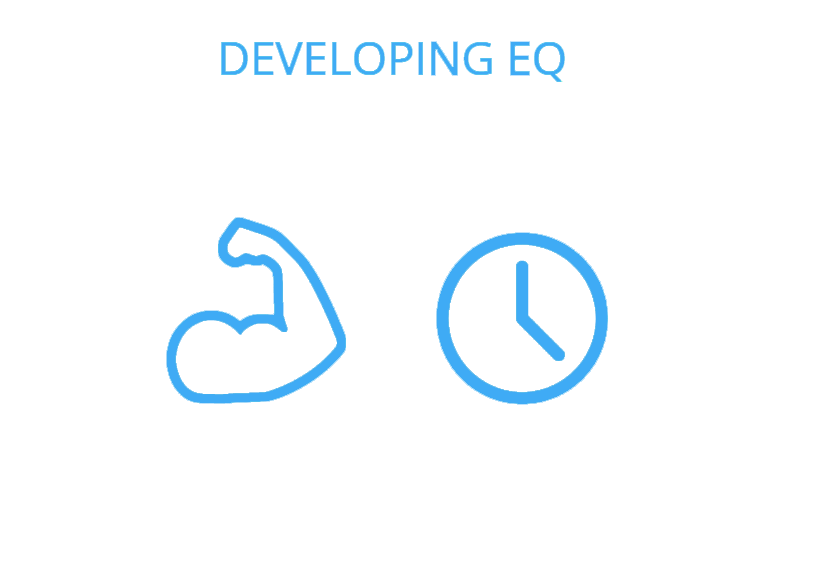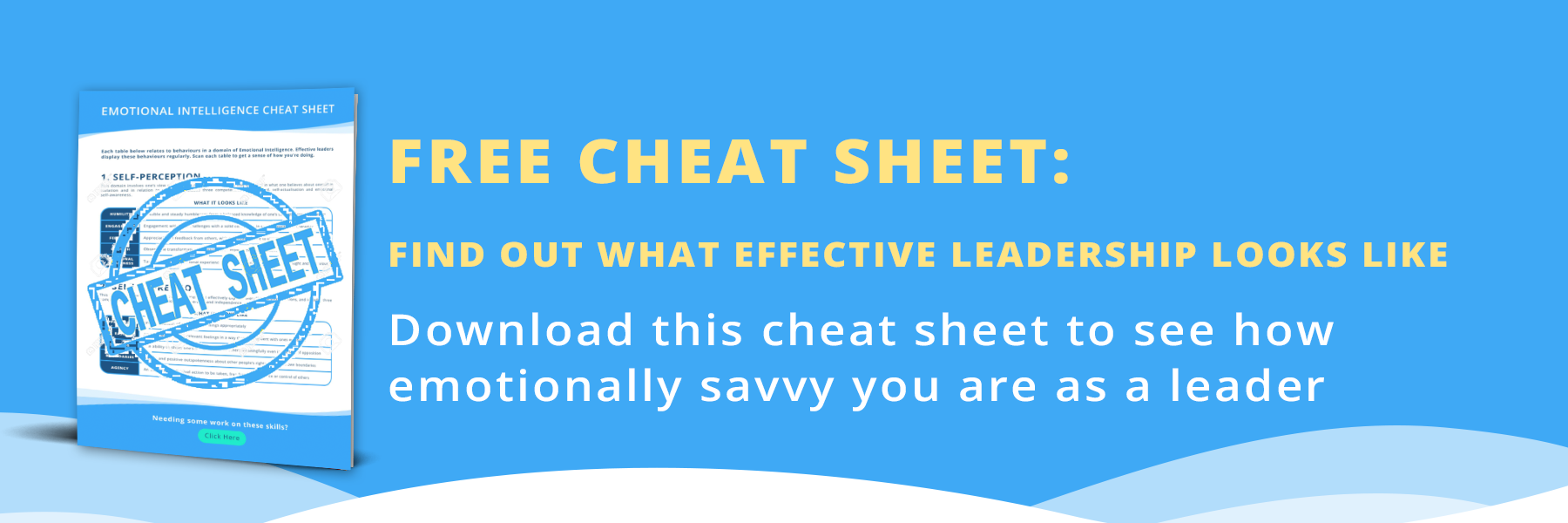What makes a great leader?
When you reflect on this question, you probably come up with something like: confidence, humility, influence, empathy, and that special quality that makes them uniquely who they are. They’re comfortable in their own skins.
You’d be right. Great leaders are authentic, but they also have other qualities we admire: Leaders are trusted by everyone around them, they take care with how they say things, they make informed decisions, they listen to what others have to say, and show magnanimity in their dealings with people. Click To Tweet
These qualities not only describe great leaders, but also someone with developed Emotional Intelligence.
This is a complete guide to all you need to know about leadership and Emotional Intelligence and why this set of skills makes great leaders.
HERE’S WHAT TO EXPECT FROM THIS GUIDE:
- What is Emotional Intelligence?
- What is leadership?
- The major misunderstanding of leadership
- It’s THESE 5 skill domains that make great leaders
- 3 case histories – How to recognise a leader with Emotional Intelligence
- Can you develop Emotional Intelligence?
- Yes, here’s proof
- How to develop Emotional Intelligence
What’s Emotional Intelligence?
Emotional Intelligence is a set of skills that make people great at managing themselves and interacting with others.
With Emotional Intelligence people are better at leading others, navigating relationships, managing stress, making decisions, getting things done, and increasing their personal wellbeing.
This set of skills helps you understand your emotions and the emotions of others.
Emotional Intelligence helps you manage your interactions with the world around you, ultimately making you more effective in all areas of life.
Simply put, it makes you a better human being. Emotional intelligence is a set of skills that make people great at managing themselves and interacting with others. Click To Tweet
With Emotional Intelligence people are better at leading others, navigating relationships, managing stress, making decisions, getting things done and increasing their own wellbeing.
The good news is that every leader can develop in this area to improve their leadership capabilities.
Often Emotional Intelligence is misunderstood. It’s seen as a skill relevant only in specific domains.
When considering Emotional Intelligence in light of its role in leadership, an important starting point is a keen understanding of what it is and what it looks like practically. Any Emotional Intelligence definition includes two vital aspects:.
1. Emotional Intelligence is a set of skills
Emotional Intelligence is often misunderstood as an isolated ability, or a simple skill. Instead it is a set of competencies that help one handle oneself emotionally, and effectively interact with others.
Collectively these competencies can be called “human skills”.
2. Emotional Intelligence skills are global
The competencies that make up Emotional Intelligence play an important role in almost every part of daily life. In this sense they can have a global impact. So, while Emotional Intelligence is fundamental to leadership, it also increases your capacity as a parent, provider, friend, partner, and human being.
But how does it change you? And what does Emotional Intelligence look like, particularly in leaders in the workplace?
Individuals with high Emotional Intelligence tend to be good listeners, they consider others and respond in appropriate, inclusive, and sensitive ways.
They inspire optimism and general wellbeing in everyone around them because of their own positive outlook and their ability to make choices in the direction of wellbeing.
They’re great at navigating dynamics that involve emotions because they’re able to use emotional information intelligently, even in stressful situations.
Their general calm presence allows them to make appropriate decisions even in the most nuanced circumstances.
They often allow things to settle in themselves, and others, before they act, because they are aware of their emotions.
They may also be more capable of trusting their instincts.
They get to know themselves through honest self-evaluation.
They also invite feedback from others, without feeling threatened or offended.
They view criticism as a chance to improve and develop because they are inclined towards a growth mindset.
Those with high Emotional Intelligence recognise their own emotions and the impact these emotions have on the dynamics around them.
They also have an understanding of the emotions of others and how emotion impacts on behaviour. With high Emotional Intelligence individuals are better able to communicate capably, manage their stress, improve relationships, empathise with others, and overcome life’s challenges. Click To Tweet
The person with high Emotional Intelligence is more able to handle a wide range of circumstances or dynamics in their daily lives.
This ability to effectively navigate a wide array of dynamics engenders respect, trust, and appreciation from those around them.
These abilities are what sets successful leaders apart.
What is leadership?
MUST READ – We wrote all about leadership in this blog: Leadership and the four keys essential to leadership success.
The characteristics of high Emotional Intelligence described above are inherent to almost any theory of leadership.
John Maxwell, in his book Becoming a person of influence, describes a leader as a person who is able to influence.
True leadership cannot be awarded, appointed, or assigned. It comes only from influence, and that cannot be mandated. It must be earned. - John Maxwell Click To Tweet
For a deeper understanding of leadership, here are four essential keys of leadership:
- UNDERSTANDING the essence of leadership – that it is about influencing people towards a common goal; getting them from here to there.
- KNOWING the difference between managing and leading. The first is about the work, the second is about people.
- LIVING from the paradigm of servant leadership – the people you lead are only led if you put them before yourself and “serve” them.
- BUILDING the muscles of leadership – that Emotional Intelligence competencies are the muscles underlying leadership strength. We look at this key in more detail, so keep scrolling.
Any leader worth their salt has the confidence to act with integrity, stay in control of their emotions, listen to others, consider others’ insights, and inspire action. Leadership is not about what you know, it is about what you do. Click To Tweet
The major misunderstanding of what is to manage vs what it is to lead
A major misunderstanding amongst leaders in organisations is the notion that to know ABOUT leadership (through experience, qualifications, reading etc.) is to LEAD.
Leading people is not the sum total of the knowledge you have or the position you hold, but rather it is the way you behave that shapes others.
At its core, leadership is about people. Leaders don’t lead organisations. What is being led are the people who make up the organisation. Without PEOPLE there is no leadership, leader or leading.
And the core set of competencies that make people great at interacting with people is Emotional Intelligence. A skilled leader inspires, motivates, challenges, focuses, and unites others. They influence their teams towards a common goal. Click To Tweet
To be this needs high Emotional Intelligence.
At the heart of what it is to lead are HUMAN skills that lie in the domain of Emotional Intelligence.
There are a lot of leaders who simply cannot lead.
They may have a significant amount of industry knowledge and expertise and even decades of experience in their field, but their influence on the people they work with is missing.
There are many people who find themselves in management positions where they struggle to lead. They simply do not understand what leadership is or the key skills to enable it.
A recent study found 58% of managers did not receive any management training when promoted.
They were promoted because they were great at their job, not necessarily because they were good at leading those around them.
Lacking is a clear understanding of the radical difference between what it is to manage and what it means to lead.
Daniel Goleman writes in his book Working with Emotional Intelligence that at least 43% of talent leaving organisations do so because of poor leadership from managers.

Those in leadership seldom appreciate that it is by understanding their own emotions, and engaging with the people in their teams so that they feel seen and heard, that they become better leaders.
A good understanding of leadership helps us recognise how necessary Emotional Intelligence is for leaders to effectively lead.
Emotional Intelligence – it’s THESE 5 skill domains that make great leaders
We’ve seen that leadership is rooted in human interaction. And that Emotional Intelligence is the set of skills that most powerfully enables this human interaction.
Emotional Intelligence, then, is the most crucial set of skills for any leader.
In fact Daniel Goleman, internationally-known psychologist and author, has suggested that more than 85% of the competencies needed for effective leadership lie in the Emotional Intelligence domain.
This set of human skills is so essential to leadership that The Future of Jobs World Economic Forum places Emotional Intelligence as one of the top 10 critical skills in the 2020 workplace. Emotional Intelligence is on the “Top Ten Critical Skills List” for 2020...for people in all industries, at all levels, in every region of the world”. World Economic Forum Click To Tweet
The EQ-i 2.0 model, which we use at Mygrow, divides Emotional Intelligence into 5 broad domains, each with 3 specific competencies:
1. Self-perception
The self-perception domain involves one’s view of oneself in relation to the world, including what one believes about oneself in isolation and in relation to others. There are three skills leaders need to understand themselves, and what they believe about themselves:
- Self-regard – often associated with feelings of inner strength and self-confidence, self-regard is about the respect one holds for oneself while understanding and accepting one’s strengths and weaknesses.
- Self-actualisation – the willingness to keep on improving oneself by pursuing personally-relevant and meaningful goals that enrich life.
- Emotional self-awareness – being able to recognise and understand one’s own emotions. One can also separate out the subtleties of these emotions, understand their cause, and how they impact one’s thoughts and actions, and those of others.
In a leader self-perception translates as a visible calm and a steady humility that comes from a balanced working knowledge of one’s strengths and weaknesses; active engagement with life and its challenges with a solid confidence in one’s integrity and character; clear encouragement of feedback from others, with a constant desire to improve, and an observable transformation of criticism into growth and improvement; tuned in to one’s emotional experience of the world with a heightened awareness of the impact of those emotions on thought and behaviour.
2. Self-expression
The self-expression domain involves three skills that enable individuals to effectively and appropriately act out their thoughts and intentions:
- Emotional expression – to openly express one’s feelings verbally and non-verbally.
- Assertiveness – communicating feelings, beliefs, and thoughts openly and defending one’s personal rights and values in a socially-acceptable, inoffensive, and non-destructive way.
- Independence – being able to direct oneself, free from any emotional-dependency on others. One completes decision making, planning, and daily tasks autonomously.
In a leader self-expression translates as an assuredness when expressing feelings; an ease with making oneself vulnerable by sharing feelings, without oversharing; the ability to capably share emotional experiences with others; a calm and positive outspokenness about other people’s rights, and one’s own, without upsetting others or becoming upset oneself; and decisive action free from the influence or control of others.
3. Interpersonal skills
The interpersonal domain involves effectively interacting with, and relating to, other people and involves three skill areas:
- Interpersonal relationships – the skill to develop and maintain relationships that are satisfying to both us and those we are in relationship with, which implies trust and compassion.
- Empathy – the ability to understand and appreciate how another person feels. One is able to articulate this understanding of another’s perspective and behave towards them in a way that respects their feelings.
- Social responsibility – a willingness to contribute to society, one’s social groups, and to the welfare of others. This skill involves having a social consciousness, showing concern for the greater community, and acting responsibly.
In a leader strong interpersonal skills translate as a refined ability to work well with others; evidence of authentic relationships at home and at work; an obvious ability to listen well and not talk over others; a tendency to replace giving advice with asking questions; a refined way of giving constructive and useful feedback; an ability to consider others’ points of view; and an observable collaboration with others in the best interests of society and the environment.
4. Decision making
The decision making domain involves effectively navigating life’s choices and involves three key areas: problem-solving, reality testing and impulse control. Equipping one to become familiar, effective, and better at drawing conclusions, making choices and resolving issues.
- Problem solving – the ability to find solutions to problems where emotions are involved, which means being able to understand how these emotions might affect the decision.
- Reality testing – remaining objective and seeing things for what they are. This includes recognising when emotions or personal bias might cause one to be less objective.
- Impulse control – resisting or delaying the temptation to act, avoiding rash behaviour, and decision making.
In a leader strong decision making skills translate as: avoiding rash behaviour or emotional responses to issues; less drama and fewer problems in one’s life; the ability to understand the impact of emotions on decision making; an ability to see a situation from many angles; taking the time to make a decision keeping in mind the possibility of misreading a situation.
5. Stress management
The stress management domain is how one copes with volatility, uncertainty, complexity, and ambiguity in a constantly changing world, and involves three key skills:
- Flexibility – adapting one’s emotions, thoughts, and behaviours to unfamiliar, unpredictable and dynamic circumstances or ideas.
- Stress tolerance – coping with stressful or difficult situations while believing one can manage or influence these in a positive way.
- Optimism – remaining hopeful and resilient in spite of occasional setbacks.
In a leader good stress management translates as: the capacity to change one’s stance, outlook or ideas when the unexpected happens; combining new and creative ways of dealing with circumstances; staying calm and not getting carried away by strong emotions; the ability to stay positive despite setbacks; and an ability to remain self-motivated and instrumental in overcoming difficulties.
 Photo by engin akyurt on Unsplash
Photo by engin akyurt on Unsplash
The skills we outline above have a huge impact on all areas of leadership functioning. Meaning that developing leaders’ Emotional Intelligence profoundly affects their teams and the organisation of which they are part. Successful leaders relate to and work with others well because they’ve taken the time to cultivate self-perception, self-expression, empathy, decision making, and stress management. Click To Tweet
If you want to develop leadership, this is where you should place your energy and focus.
What does Emotional Intelligence look like in action?
How do you know what developed Emotional Intelligence looks like in leaders? How do you know if any Emotional Intelligence training is affecting their behaviour?
Below you’ll find three case histories of how leaders have turned themselves and their teams around by applying Emotional Intelligence in the workplace.
THREE CASE HISTORIES:
HOW to recognise a leader with Emotional Intelligence
1. The leader who talks more than he listens
|
Steven thinks he’s good at responding appropriately to his team. He’s an expressive individual who finds it easy to talk, and is confident around people. He tends to talk a lot in meetings – he sees this as being inclusive; as a way of sharing what he knows with his team. One of his favourite ways of gauging whether or not he and the team are on the same page, is to ask them if they agree – thumbs up for agree, thumbs down for disagree. He gets a lot of thumbs up from his team. They’re an agreeable lot. And if only one or two of the team’s thumbs are at half mast, he’s not too concerned. If the majority of the team is happy, so is he. After a few weeks of working on the self-awareness course on Mygrow, Steven began to reflect on how little he actually hears from his team. How he could listen more. Perhaps start asking Philippa and Tebogo why their thumbs are so often at half mast? Would they have the courage to lower those thumbs if he gave them the opportunity? If he asked differently or gave the team the opportunity to give him anonymous feedback using a useful online tool about specific topics, would he hear something he might not like? He began to ask himself difficult questions. Perhaps he is afraid to hear opinions other than his own? And shouldn’t he, as a leader, have the courage to be wrong? Or to at least hear others’ opinions? |
2. The leader who can’t speak up when she should
 Photo by Arlington Research on Unsplash
Photo by Arlington Research on Unsplash
|
Sameera runs a call centre. She has a large team reporting to her and has a lot of experience. She runs a tight ship. Most of her team respond well to her style of management, even though many of them would rather she was a little less stressed. Her inability to function well under pressure is most noticeable towards month end if targets aren’t met. She becomes aggressive. She has been known to snap at those she doesn’t think are performing well. She tends to deliver her opinion and then turn on her heel, walking away leaving them angry and embarrassed. Her avoidance of confrontation presents further when she postpones speaking to team members about things like changing the way they talk to clients on the phone, or taking too much time away from their desks on coffee and smoke breaks. Instead Sameera stews quietly, getting more and more angry. Things come to a head during performance appraisals where, instead of broaching the subject calmly, she demonstrates classic passive aggressive tendencies, marking these individuals down on performance, communicating her displeasure in her score, rather than face-to-face when she first becomes aware of the behaviour. Her team thus cannot trust her. Over the course of an assertiveness course on Mygrow Sameera became conscious of how difficult she finds it to express her displeasure. She had not appreciated the damage that shouting, or choosing not to confront at all, had on her team. She has begun tackling difficult conversations by first practising how she is going to talk to someone. In this way her anxiety at confrontation has eased and she has been able to be calmer and more measured in her conversations. The relief she feels at her ability to turn what was a highly stressful way of behaving around by being more assertive, has given her confidence and lowered her stress at work. She finds herself joking with her team and is a lot more good-natured and open-hearted with them. |
3. The leader who regards those older than himself as technology dinosaurs
|
Richard is a young and dynamic IT leader in a prominent company producing cutting-edge technology. He’s brilliant at what he does. His team loves him – he’s demanding but fun, he’s honest and forthright. They know where they stand with him. The team works hard, but Richard is fair and they have flexible working hours and opportunities to upskill at work, which makes up for the hard work. There are a couple of older people in the company; one or two directors on the ExCo, who are not totally comfortable with technology. Richard often finds himself impatient and angry in the face of their inability to keep up, particularly when he’s presenting ideas to ExCo. His impatience registers as arrogance and he tends to be dismissive and flippant. This creates an atmosphere. A couple of his contemporaries sometimes feel embarrassed for the older members of the team, who bring valuable insight, particularly financial understanding of the business. Interpersonal skills training during one of Mygrow’s online modules made Richard pause to consider his understanding of empathy. Richard seldom considered empathy a necessary skill for work. Now he’s realised that different generations have different needs and he understands that far from demonstrating stupidity, his older colleagues may have a different perspective on things. He wonders if perhaps a more in-depth explanation might bring about a mutual understanding. He’s started supplying additional support material for ExCo to study in their own time before he presents to them, which gives them time to ask questions and for everyone to be part of the conversation. Older ExCo members have been able to come back to him with observations he’s found valuable. In this way he’s come to understand the different strengths people bring and that a little humility goes a long way, difficult as this has been for him to take on board. |
Steven, Richard and Sameera’s stories are examples of how just three of the competency areas of Emotional Intelligence can have a direct impact on the way a leader behaves and impacts on his/her team.
Is Emotional Intelligence a skill you can develop?
In a nutshell: yes!
Emotional Intelligence skills may come more naturally to some than others, but anyone can develop them.
You can develop Emotional Intelligence by working on the five skill domains – self-perception, self-expression, interpersonal, decision making, and stress management.
You can develop Emotional Intelligence by working on self-perception, self-expression, interpersonal, decision making, and stress management. Click To Tweet
Emotional Intelligence can be developed and here’s proof
In 2009, a study showed overall Emotional Intelligence is something one can develop in the short-term and over the long-term.
The experiment had a group of psychology students attend four sessions of two-and-a-half hours each, over a four-week period. With a one-week interval between each session, giving participants time to apply the content in their daily lives.
The sessions were based on short lectures, role plays, group discussions, and readings.
The participants also had a personal diary in which they wrote daily about one emotional experience.
The study’s findings showed that not only were there significant improvements in Emotional Intelligence in the experimental group, but all positive changes remained significant six months after the intervention.
So, changes to Emotional Intelligence were evident in the short-term AND persistent over the long-term.
START TO DEVELOP YOUR EMOTIONAL INTELLIGENCE – SIGN UP FOR A FREE TRIAL NOW

How to develop Emotional Intelligence
How do leaders learn to manage emotions, become mindful of how they speak, learn to listen, understand what stresses them, respond instead of reacting, and remain positive, even in adversity?
How do leaders develop this set of qualities that builds trust and motivates and inspires their teams? The way to bring about long-term behavioural change is to rewire the emotional centres of the brain. Click To Tweet
Developing Emotional Intelligence is similar to becoming a musician, or a sportsman. You’re not going to attend a two-hour workshop and walk out a brilliant cellist or a rugby player.
Likewise, one doesn’t become emotionally intelligent overnight. Developing Emotional Intelligence involves regular practise over time. Click To Tweet
You’re going to have to work a certain set of muscles consistently, over time, until one day, you discover that living and interacting with those around you suddenly feels A LOT easier.
One does this by practising a series of techniques, over time.
These techniques rewire the neural circuitries in the emotional centres of the brain, and, over time, make you better at being you.
You can fast-track your Emotional Intelligence by signing on to a platform like Mygrow, where a series of daily activities and techniques will help you master this set of human skills.
Leaders with developed Emotional Intelligence make others feel good.
They know themselves well, they recognise their own emotions, understanding how these emotions affect others. Their teams want them around, and want to be around them.
Become a better leader. Become a better you.
Mygrow helps you learn the skills you need to be fulfilled and successful at work and in life.
It does this by methodically building Emotional Intelligence using daily techniques. These techniques create pathways in the emotional centre of the brain over time, helping you interact with your world in new and positive ways.
You access the learning and techniques online, every day, for 15 minutes.
Mygrow makes you a better leader. You, but a more effective and composed you.



